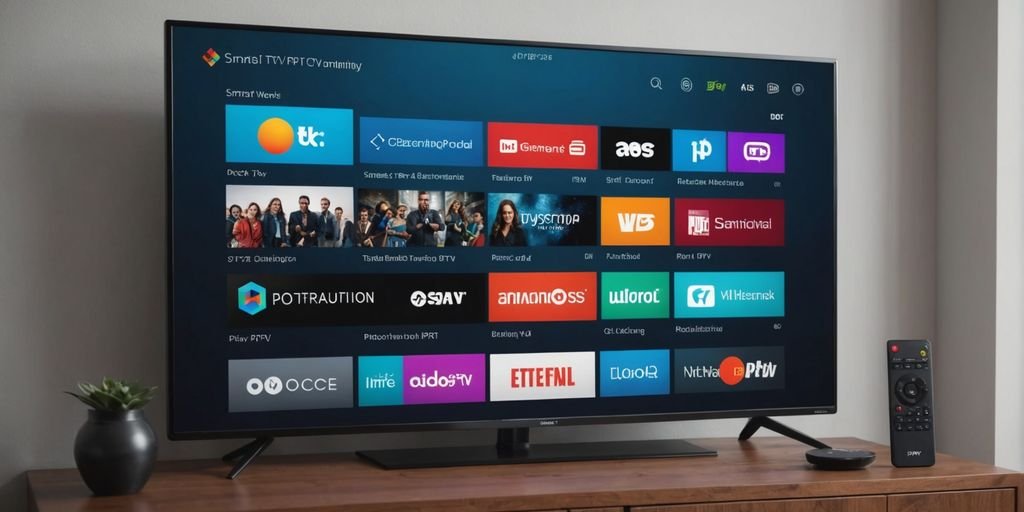Table of Contents
In the rapidly evolving world of technology and entertainment, cutting the cord has become a popular trend among consumers looking to break free from traditional cable and satellite providers. With the rise of IPTV (Internet Protocol Television) devices, such as streaming boxes and smart TVs, people are discovering a whole new way to watch their favorite shows and movies. IPTV entertainment is revolutionizing the entertainment industry by offering more choices, flexibility, and control to viewers.
Key Takeaways
- IPTV is transforming home entertainment by providing an alternative to traditional cable and satellite TV.
- The rise of IPTV in Canada is driven by technological advancements and changing consumer preferences.
- IPTV offers numerous advantages over traditional cable, including cost savings, a wider range of content, and enhanced user experience.
- Choosing the right IPTV service involves evaluating content libraries, understanding subscription plans, and considering customer support and reliability.
- The future of IPTV technology includes integration with smart home devices, advancements in streaming quality, and addressing potential challenges.
The Rise of IPTV in Canada
Historical Context and Evolution
IPTV, or Internet Protocol Television, has transformed the way Canadians consume television content. Initially, traditional cable and satellite services dominated the market. However, with the advent of high-speed internet, IPTV’s popularity has surged. This shift began in the early 2000s and has continued to gain momentum, offering viewers a more flexible and diverse range of programming options.
Current Market Trends
In Canada, IPTV’s popularity is on the rise due to its extensive channel variety and superior streaming quality. The market has seen significant growth, with more households opting for IPTV services over traditional cable. This trend is driven by the demand for on-demand content, live TV, and the ability to stream on multiple devices.
Key Players in the Canadian Market
Several key players dominate the Canadian IPTV market, including:
- Bell Fibe TV
- Rogers Ignite TV
- Telus Optik TV
These providers offer a wide range of channels, competitive pricing, and advanced features, making them popular choices for Canadian consumers.
The rise of IPTV in Canada signifies a major shift in how television content is delivered and consumed, offering viewers more control and customization than ever before.
Advantages of IPTV Over Traditional Cable
IPTV often proves to be more cost-effective in the long run. Flexible subscription plans allow users to select only the channels they want, eliminating the expense of unwanted broadcasts. This customization means no more expensive contracts or hidden fees, just a package that fits your budget and viewing habits.
One of the standout features of IPTV is the vast array of content available. With thousands of channels and apps at your fingertips, you can easily tailor your entertainment choices to suit your preferences. Whether you’re a sports fan, movie buff, or reality TV junkie, there’s something for everyone on these versatile devices.
IPTV offers a superior user experience with interactive features and multiscreen viewing options. The ability to customize your viewing experience, along with on-demand content, makes IPTV a compelling choice for modern viewers. The interface is designed to be user-friendly, ensuring that even those who are not tech-savvy can navigate with ease.
IPTV is not just about cutting the cord; it’s about redefining the way we experience entertainment and information. In a world increasingly connected and personalized, IPTV emerges as a powerful tool for shaping a future where viewers are truly in control.
How to Choose the Right IPTV Service
Selecting the perfect IPTV provider can be a daunting task, but with the right criteria, you can make an informed decision. This guide aims to equip you with the essential criteria and tips to choose the ideal IPTV provider for your preferences.
Evaluating Content Libraries
When choosing an IPTV service, it’s crucial to evaluate the content libraries offered. Look for a provider that offers a wide range of channels, including local, international, and premium options. A diverse content library ensures that you have access to a variety of entertainment choices.
Understanding Subscription Plans
Subscription plans can vary significantly between providers. It’s important to understand the different plans available and what they include. Consider factors such as the number of devices supported, the length of the subscription, and any additional fees. Here’s a quick comparison table to help you evaluate:
| Provider | Monthly Cost | Devices Supported | Additional Fees |
|---|---|---|---|
| BestIPTVCa | $10 | 2 | None |
| MapleIPTV | $15 | 4 | $5 setup fee |
| BestIPTVSub | $20 | Unlimited | None |
Customer Support and Reliability
Reliable customer support is essential when dealing with any service issues. Look for providers that offer 24/7 support and have a good reputation for resolving issues promptly. Customer support can make or break your IPTV experience.
Choosing the right IPTV provider can significantly enhance your home entertainment experience. Make sure to consider all the factors mentioned above to find the best fit for your needs.
Legal and Regulatory Landscape for IPTV in Canada
The regulation of IPTV services in Canada is governed by several laws and regulations that aim to ensure fair use, copyright respect, and competitive equity in the market. Understanding these legal frameworks is crucial for both providers and consumers to navigate the IPTV landscape effectively.
Copyright and Licensing Issues
IPTV services must adhere to strict copyright laws to avoid legal repercussions. This includes obtaining proper licenses for the content they distribute. Unauthorized distribution can lead to severe penalties, making it essential for providers to comply with copyright regulations.
Government Regulations
The Canadian government has implemented various regulations to oversee IPTV services. These regulations are designed to promote fair competition and protect consumer interests. Providers must ensure they meet all regulatory requirements to operate legally in the country.
Consumer Rights and Protections
Consumers are entitled to certain rights and protections when using IPTV services. This includes the right to fair billing practices, data privacy, and access to customer support. Understanding these rights can help consumers make informed decisions and seek redress if needed.
As IPTV continues to gain prominence, policymakers will need to address issues related to market competition, content licensing, and consumer protection. This evolving landscape presents both challenges and opportunities for IPTV providers.
Future Trends in IPTV Technology
Integration with Smart Home Devices
The integration of IPTV with smart home devices is set to redefine home entertainment. Imagine controlling your TV with voice commands through your smart speaker or having your lights dim automatically when you start a movie. This seamless interaction between devices will enhance user convenience and create a more immersive viewing experience.
Advancements in Streaming Quality
Advancements in technology have played a crucial role in the rise of IPTV. Innovations such as 5G networks, improved compression techniques, and enhanced video codecs are making it possible to stream content in ultra-high definition with minimal buffering. These improvements will not only provide a better viewing experience but also make IPTV more accessible and reliable.
Potential Challenges and Solutions
While the future of IPTV looks promising, there are potential challenges that need to be addressed. Issues such as bandwidth limitations, data privacy concerns, and the need for robust customer support are critical. However, ongoing advancements in technology and regulatory frameworks are expected to offer viable solutions to these challenges.
The future of IPTV is bright, with continuous innovations and improvements paving the way for a more connected and immersive home entertainment experience.
Setting Up IPTV at Home
Setting up IPTV at home can transform your entertainment experience, offering a flexible and customizable way to enjoy your favorite content. Here’s a step-by-step guide to get you started.
Required Equipment and Setup
To begin, you’ll need a few essential items:
- IPTV Box or Smart TV: This is the primary device that will stream your IPTV content.
- Stable Internet Connection: A high-speed internet connection is crucial for smooth streaming.
- Subscription to an IPTV Service: Choose a reliable IPTV service provider.
Once you have these, follow these steps:
- Connect your IPTV box or smart TV to your internet router using an Ethernet cable or Wi-Fi.
- Power on the device and navigate to the settings menu.
- Enter your IPTV service subscription details to access the content library.
Optimizing Internet Connection
A stable and fast internet connection is vital for an uninterrupted viewing experience. Here are some tips to optimize your connection:
- Use a Wired Connection: Whenever possible, use an Ethernet cable instead of Wi-Fi for a more stable connection.
- Upgrade Your Router: Ensure your router can handle high-speed internet and multiple devices.
- Check Your Internet Speed: Regularly test your internet speed to ensure it meets the requirements of your IPTV service.
Troubleshooting Common Issues
Even with the best setup, you might encounter some issues. Here are common problems and their solutions:
- Buffering: This can often be resolved by checking your internet speed or switching to a wired connection.
- No Signal: Ensure all cables are securely connected and your subscription is active.
- App Crashes: Restart your device or reinstall the IPTV app.
Pro Tip: Regularly updating your IPTV app and device firmware can prevent many common issues and improve performance.
Impact of IPTV on Canadian Media Consumption
The shift towards IPTV as the premier means of television consumption has gathered a remarkable momentum in Canada. Consumers now enjoy greater choice and flexibility in how they access and consume television content. Advanced features such as video-on-demand, time-shifted viewing, and interactive applications have revolutionized the viewing experience.
IPTV has also had a significant impact on local content production. With the rise of IPTV, there is an increased demand for original programming, which has led to a surge in local content creation. This shift not only supports local talent but also ensures that Canadian stories and perspectives are well-represented in the media landscape.
When compared to global trends, Canada’s adoption of IPTV is on par with other leading markets. The flexibility and personalized viewing experiences offered by IPTV have made it a popular choice worldwide. However, Canada faces unique challenges, such as ensuring robust infrastructure to support high-quality streaming and addressing regulatory concerns.
Conclusion
As we move further into the digital age, IPTV is undeniably revolutionizing home entertainment. With its user-friendly interfaces, extensive content libraries, and cost-effective pricing, IPTV offers a compelling alternative to traditional cable and satellite TV. Despite challenges such as bandwidth limitations and copyright concerns, the advantages of IPTV are clear. It provides viewers with unprecedented control and flexibility, allowing them to tailor their viewing experiences like never before. The cord-cutting movement is more than just a trend; it’s a significant shift in how we consume media. Embrace the future of television with IPTV and discover a world of endless possibilities.

Frequently Asked Questions
What is IPTV?
IPTV stands for Internet Protocol Television. It is a technology that delivers television content over the internet rather than through traditional cable or satellite formats.
How does IPTV differ from traditional cable TV?
Unlike traditional cable TV, IPTV uses internet protocols to stream content. This allows for greater flexibility, on-demand viewing, and often lower costs.
Is IPTV legal in Canada?
Yes, IPTV is legal in Canada. However, the legality depends on the content being streamed and whether it is properly licensed. Always ensure you are using a legitimate IPTV service.
What equipment do I need to set up IPTV at home?
To set up IPTV at home, you typically need a compatible device such as a smart TV, streaming box, or a computer, along with a reliable internet connection.
Can I save money by switching to IPTV?
Yes, many users find that they save money by switching to IPTV due to lower subscription costs and the elimination of long-term contracts typically associated with traditional cable services.
What should I consider when choosing an IPTV service?
When choosing an IPTV service, consider factors such as content library, subscription plans, customer support, and reliability to ensure the service meets your needs.

